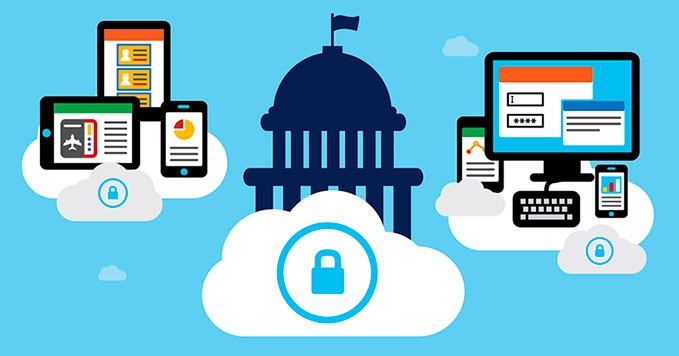
-
Table of Contents
Empowering Government with Cloud Computing: Revolutionizing Public Services
Introduction
Cloud computing in government refers to the utilization of cloud-based technologies and services to enhance the delivery of public services. This approach allows government agencies to store, manage, and process data and applications on remote servers, providing numerous benefits such as increased efficiency, cost savings, scalability, and improved accessibility. By leveraging cloud computing, governments can streamline their operations, improve collaboration, and ultimately enhance the quality and accessibility of public services for citizens.
Benefits of Cloud Computing in Government: Improving Efficiency and Cost-effectiveness
Cloud Computing in Government: Enhancing Public Services
Cloud computing has revolutionized the way governments operate, offering numerous benefits that enhance efficiency and cost-effectiveness in the delivery of public services. By leveraging the power of the cloud, governments can streamline their operations, improve collaboration, and provide citizens with better access to services and information.
One of the key advantages of cloud computing in government is its ability to improve efficiency. Traditionally, government agencies have relied on on-premises infrastructure, which often requires significant investments in hardware, software, and maintenance. This can be a time-consuming and costly process. However, with cloud computing, governments can access computing resources on-demand, eliminating the need for upfront investments and reducing the time required to set up new systems.
Furthermore, cloud computing allows for scalability, enabling government agencies to easily adjust their computing resources based on demand. This flexibility ensures that agencies can efficiently handle peak periods, such as tax season or during emergencies, without the need to maintain excess capacity during slower periods. By only paying for the resources they use, governments can optimize their spending and allocate their budgets more effectively.
In addition to improving efficiency, cloud computing also enhances collaboration among government agencies. With cloud-based platforms, multiple agencies can securely access and share data, documents, and applications in real-time. This eliminates the need for manual data transfers and reduces the risk of errors or data duplication. By promoting collaboration, cloud computing enables government agencies to work together more effectively, leading to better decision-making and improved service delivery.
Moreover, cloud computing enables governments to provide citizens with better access to services and information. By hosting applications and data in the cloud, governments can offer online portals and mobile applications that allow citizens to access services and information anytime, anywhere. This not only improves convenience for citizens but also reduces the burden on government offices, as citizens can complete tasks online without the need for in-person visits. For example, citizens can file taxes, renew licenses, or access public records through secure online platforms.
Furthermore, cloud computing enhances data security and privacy in government operations. Cloud service providers invest heavily in security measures, such as encryption, firewalls, and intrusion detection systems, to protect data stored in the cloud. This level of security often exceeds what government agencies can achieve on their own. Additionally, cloud providers adhere to strict compliance standards, ensuring that sensitive government data is handled in accordance with legal and regulatory requirements.
In conclusion, cloud computing offers numerous benefits for governments, enhancing efficiency and cost-effectiveness in the delivery of public services. By leveraging the power of the cloud, governments can streamline their operations, improve collaboration among agencies, and provide citizens with better access to services and information. Furthermore, cloud computing enhances data security and privacy, ensuring that sensitive government data is protected. As governments continue to embrace digital transformation, cloud computing will play a crucial role in enhancing public services and driving innovation in the public sector.
Security and Privacy Concerns in Cloud Computing for Government Agencies
Cloud Computing in Government: Enhancing Public Services
Security and Privacy Concerns in Cloud Computing for Government Agencies
Cloud computing has become an integral part of the modern digital landscape, offering numerous benefits to government agencies in terms of efficiency, cost savings, and scalability. However, as with any technological advancement, there are concerns surrounding security and privacy when it comes to adopting cloud computing in the public sector.
One of the primary concerns for government agencies is the security of sensitive data stored in the cloud. With the increasing number of cyber threats and sophisticated hacking techniques, ensuring the protection of classified information is of utmost importance. Government agencies deal with a vast amount of sensitive data, including citizen records, financial information, and national security data. Any breach in the cloud infrastructure could have severe consequences, compromising national security and public trust.
To address these concerns, cloud service providers must implement robust security measures. Encryption is a critical component of cloud security, ensuring that data is protected both during transmission and while at rest. Additionally, multi-factor authentication and access controls should be in place to prevent unauthorized access to sensitive information. Regular security audits and vulnerability assessments are also necessary to identify and address any potential weaknesses in the cloud infrastructure.
Another concern related to cloud computing in government is the issue of data privacy. Government agencies are responsible for safeguarding citizens’ personal information, and any mishandling of data can lead to privacy breaches and legal consequences. When data is stored in the cloud, there is always a risk of unauthorized access or data leakage, especially if the cloud service provider is not compliant with privacy regulations.
To mitigate these risks, government agencies must carefully select cloud service providers that adhere to strict privacy standards. Compliance with regulations such as the General Data Protection Regulation (GDPR) ensures that personal data is handled in a secure and transparent manner. Additionally, government agencies should have clear data governance policies in place, outlining how data is collected, stored, and shared in the cloud. Regular audits and assessments of the cloud service provider’s privacy practices are essential to maintain data privacy and compliance.
Furthermore, the location of data storage is another aspect that raises concerns for government agencies. Some countries have strict data sovereignty laws, requiring that certain types of data remain within their borders. This can pose challenges for government agencies that want to adopt cloud computing, as their data may be stored in servers located outside their jurisdiction.
To address this concern, government agencies can opt for cloud service providers that offer data centers within their country or region. This ensures compliance with data sovereignty laws and provides a level of control over where the data is stored. Additionally, contractual agreements with the cloud service provider should include clauses that guarantee data sovereignty and restrict access to the data by unauthorized entities.
In conclusion, while cloud computing offers numerous benefits for government agencies, security and privacy concerns must be addressed to ensure the protection of sensitive data. Robust security measures, compliance with privacy regulations, and careful consideration of data sovereignty issues are essential for government agencies to confidently adopt cloud computing. By addressing these concerns, government agencies can harness the power of cloud computing to enhance public services while maintaining the highest standards of security and privacy.
Cloud Computing Adoption in Government: Challenges and Best Practices
Cloud Computing Adoption in Government: Challenges and Best Practices
Cloud computing has become increasingly popular in the public sector, with governments around the world recognizing its potential to enhance public services. However, the adoption of cloud computing in government comes with its own set of challenges. In this article, we will explore these challenges and discuss best practices for successful implementation.
One of the main challenges faced by governments when adopting cloud computing is the issue of data security. Governments deal with sensitive and confidential information, and ensuring the protection of this data is of utmost importance. Cloud service providers must have robust security measures in place to safeguard against unauthorized access and data breaches. Governments should carefully evaluate the security protocols of potential cloud providers and ensure that they comply with industry standards and regulations.
Another challenge is the need for interoperability and integration with existing systems. Governments often have legacy systems in place that need to be integrated with cloud-based solutions. This can be a complex process, requiring careful planning and coordination. Governments should consider the compatibility of their existing systems with cloud solutions and work closely with their IT departments to ensure a smooth transition.
Cost is also a significant factor to consider when adopting cloud computing in government. While cloud solutions can offer cost savings in terms of infrastructure and maintenance, there may be additional costs associated with data migration, training, and ongoing support. Governments should conduct a thorough cost analysis to determine the long-term financial implications of adopting cloud computing and ensure that it aligns with their budgetary constraints.
Furthermore, governments must address legal and regulatory issues when adopting cloud computing. Data protection laws and regulations vary from country to country, and governments must ensure that they comply with these regulations when storing and processing data in the cloud. Additionally, governments should consider the jurisdiction of their cloud service provider and the implications it may have on data sovereignty.
To overcome these challenges, governments can follow best practices for successful cloud computing adoption. Firstly, it is crucial to have a clear strategy and roadmap in place. Governments should define their objectives, assess their current IT infrastructure, and determine the areas where cloud computing can bring the most value. This will help in selecting the right cloud service provider and developing a comprehensive implementation plan.
Secondly, governments should prioritize security and privacy. They should conduct thorough due diligence on potential cloud service providers, ensuring that they have robust security measures in place. Governments should also establish clear data governance policies and procedures to ensure compliance with legal and regulatory requirements.
Thirdly, governments should invest in training and capacity building. Cloud computing requires a different skill set, and governments should provide training to their IT staff to ensure they have the necessary expertise to manage and maintain cloud-based solutions. Additionally, governments should educate their employees on the benefits and risks of cloud computing to promote a culture of security and data protection.
Lastly, governments should foster collaboration and knowledge sharing. They should engage with other government agencies and industry experts to learn from their experiences and share best practices. Collaboration can help governments overcome challenges and accelerate the adoption of cloud computing in the public sector.
In conclusion, while the adoption of cloud computing in government comes with its challenges, it also offers immense potential to enhance public services. By addressing issues such as data security, interoperability, cost, and legal compliance, governments can successfully adopt cloud computing and reap its benefits. By following best practices and fostering collaboration, governments can pave the way for a more efficient and effective public sector.
Conclusion
In conclusion, cloud computing has the potential to greatly enhance public services in government. It offers numerous benefits such as increased efficiency, cost savings, scalability, and improved data security. By adopting cloud computing solutions, governments can streamline their operations, provide better services to citizens, and promote innovation in the public sector. However, careful planning, robust security measures, and effective governance frameworks are essential to ensure successful implementation and maximize the potential benefits of cloud computing in government.




